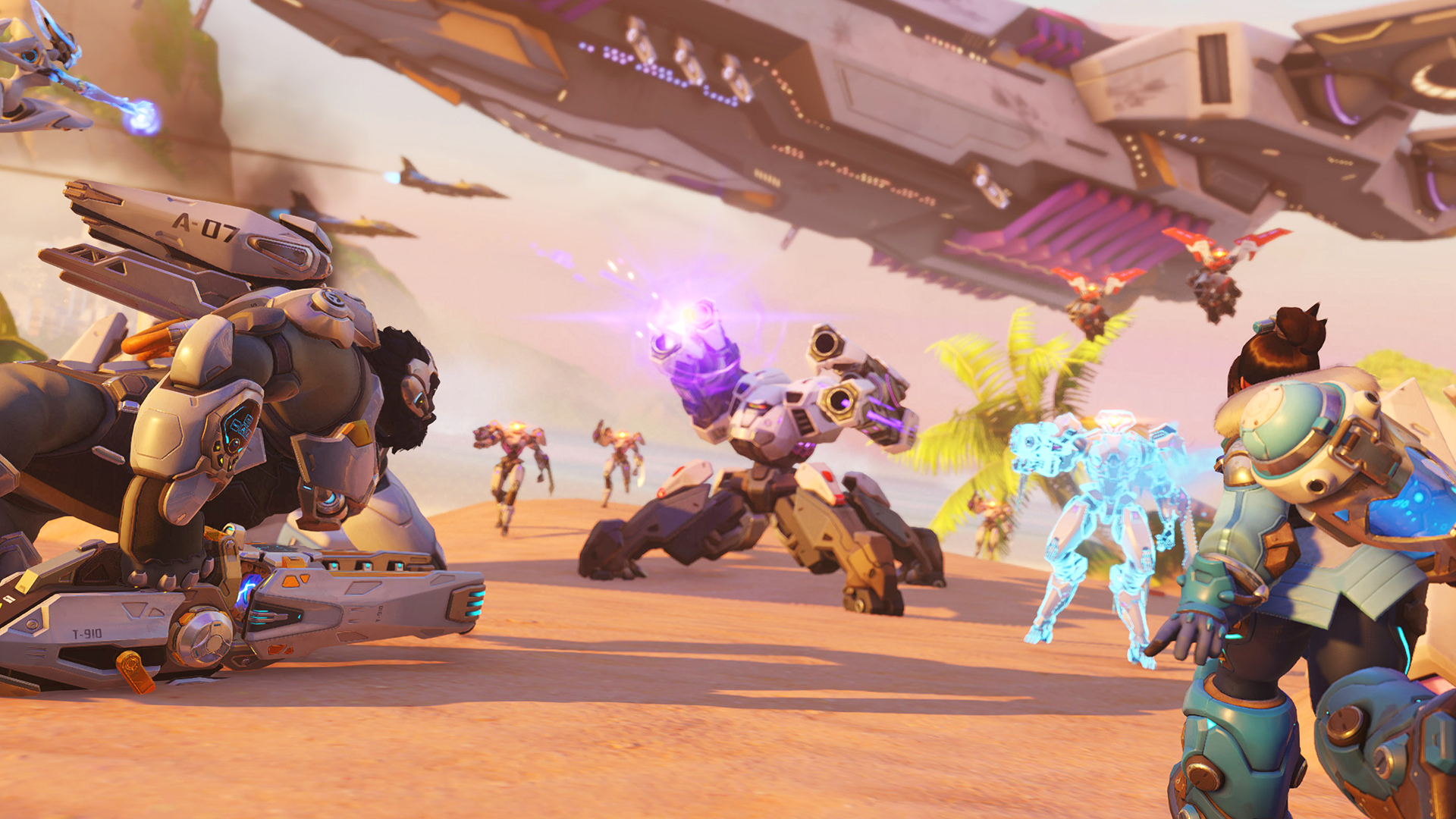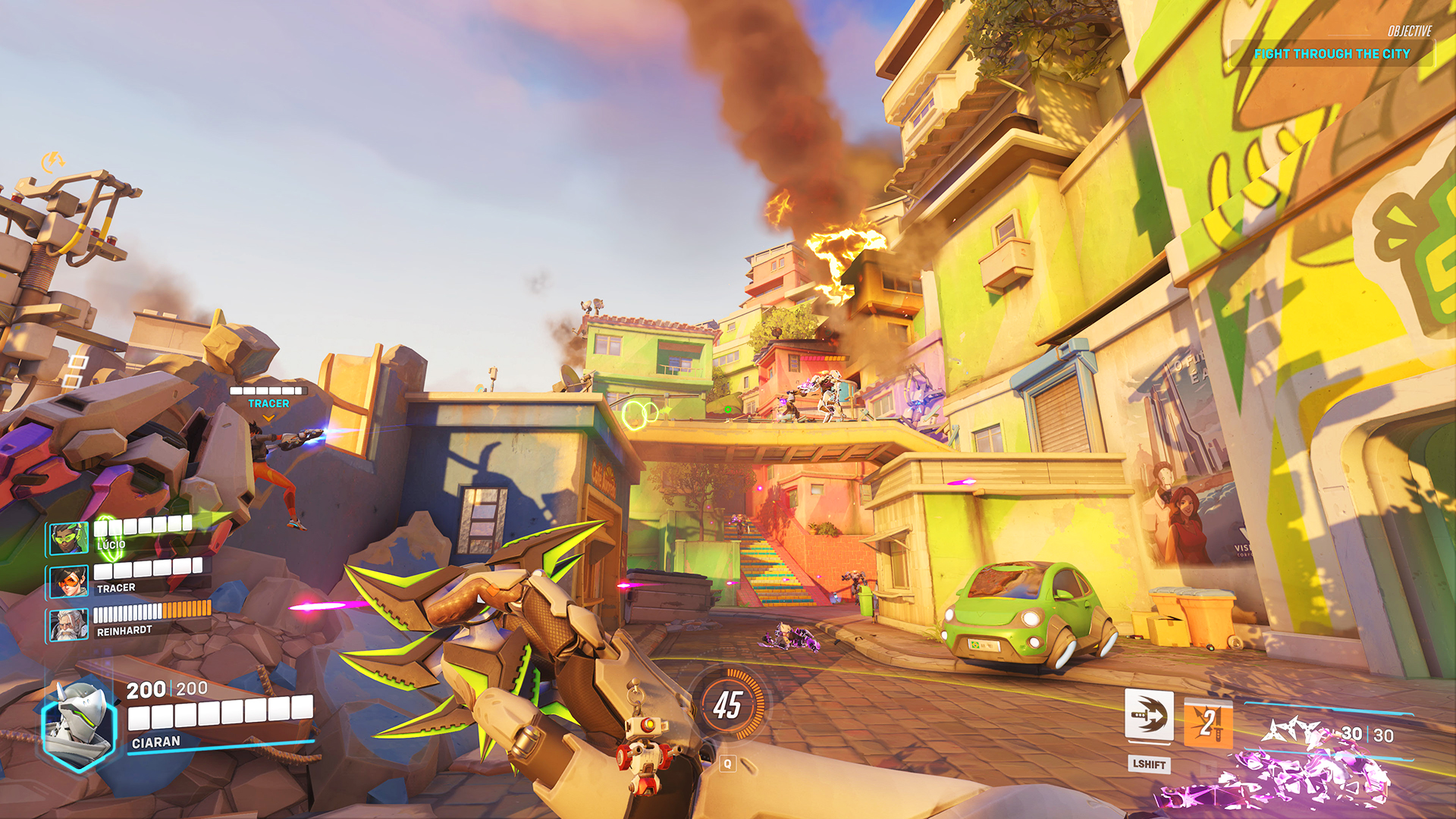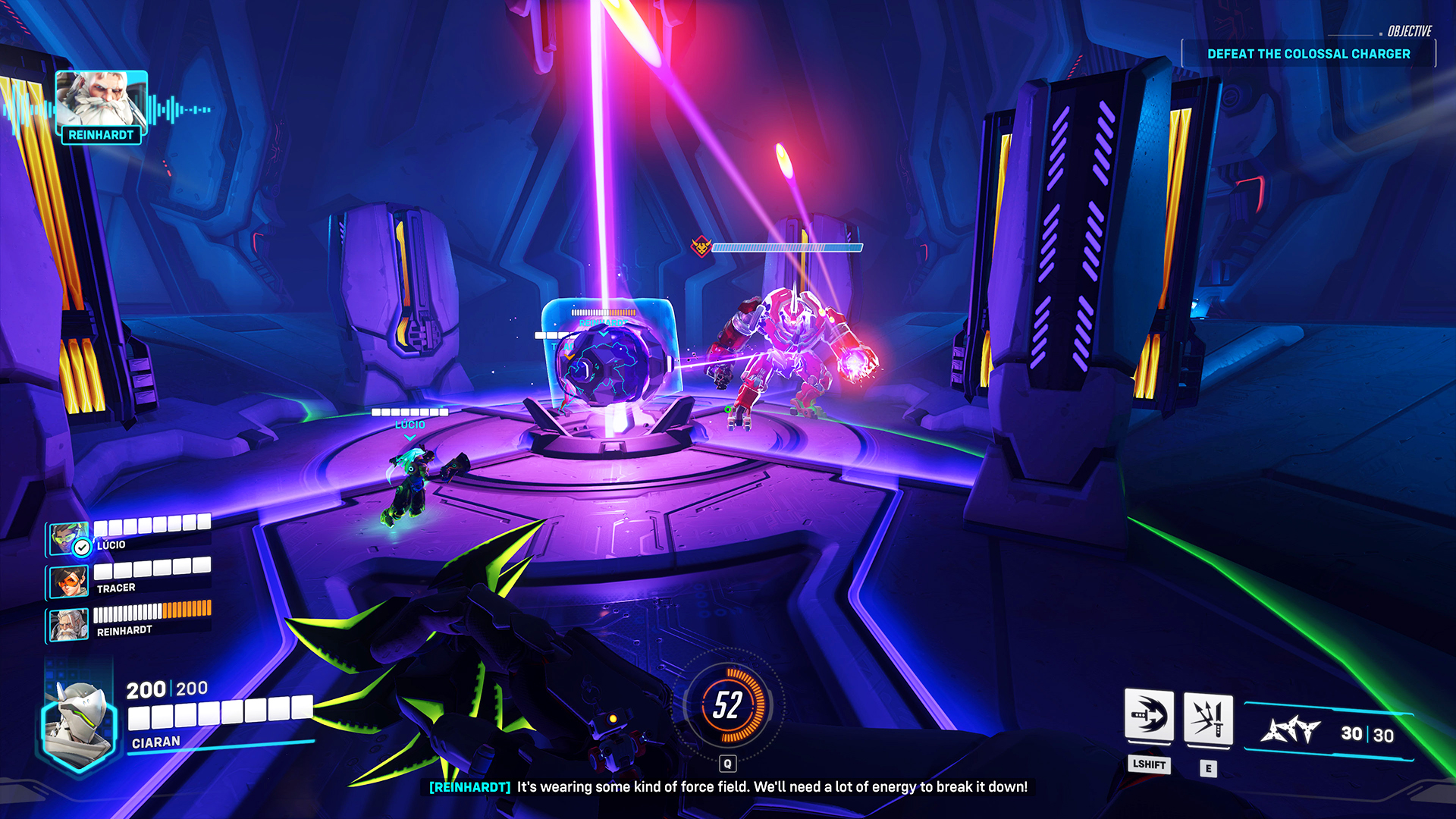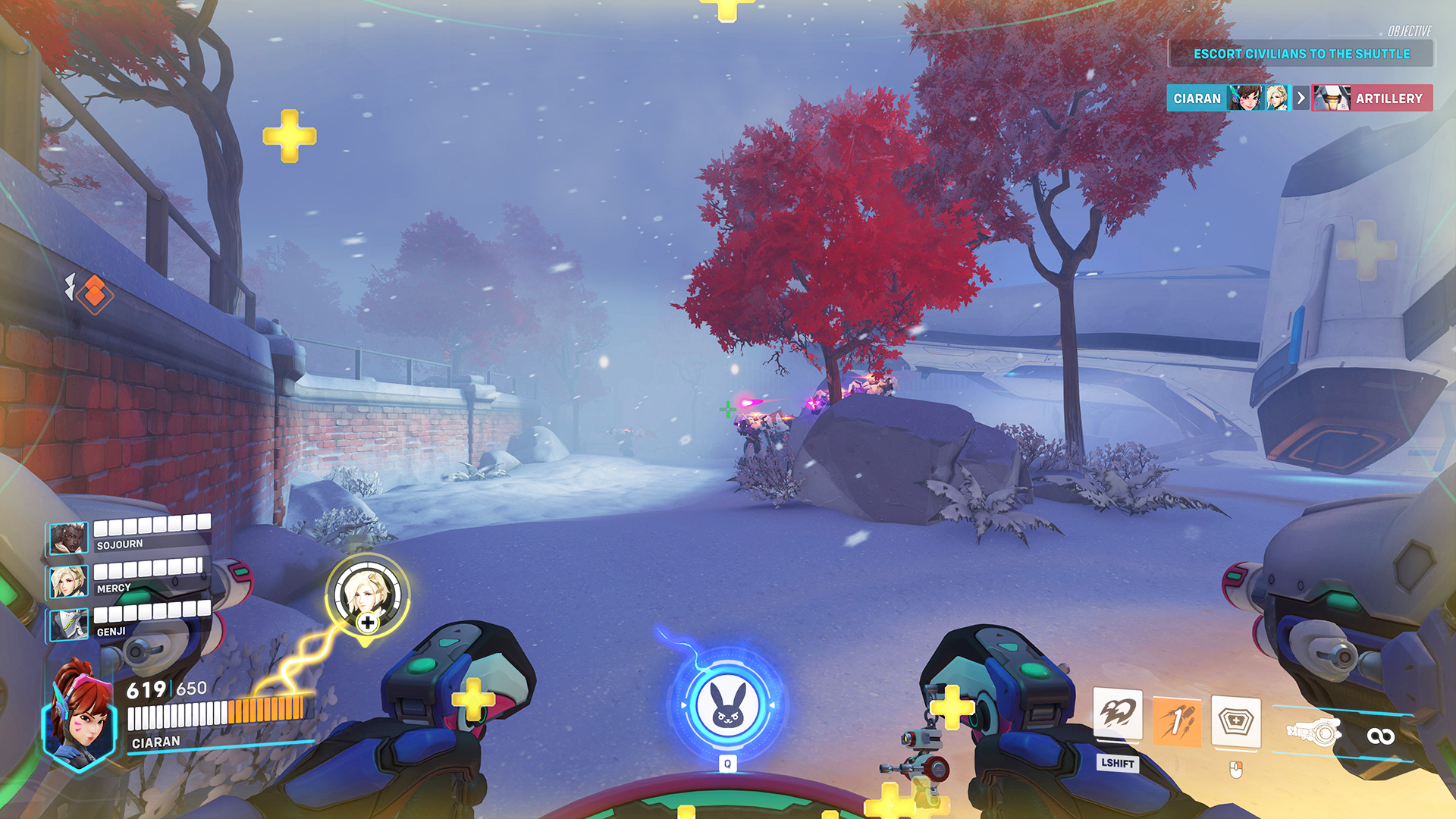
For $15, Overwatch 2's Invasion story missions are around the price of a movie ticket and take about as long to fully complete. All three of them are bookended by cutscenes featuring a cast of characters we haven't seen meaningfully interact in years—or at all. It may not be the expansive co-op campaign with skill trees that Blizzard announced in 2019, but for current Overwatch fans, it's a start.
Lapsed Overwatch players looking to return probably won't find enough to chew on here: each mission lasts around 15 minutes and replaying them as different heroes will only earn you some extraneous info on what the cast is up to these days. Invasion's missions lean on the charming interactions between the heroes while you fight through mostly forgettable enemy robots. If Avengers-style quips between Reinhardt and Lucio aren't your thing, you might want to wait for the next round of missions, which won't arrive until next year.
For Overwatch obsessives like me, Invasion is a glimpse at what PvE can look like with a larger scope than what we've seen before. But only a glimpse, because, apart from the final mission, the new enemy types and scenarios are too simple to capture the kind of heroism Overwatch tries so hard to depict. Null Sector's forces are pathetic pushovers, so fights feel like shooting galleries where you're simply picking what flavor of weapon you want to use. You don't even get to pop your ultimate very often.
A second mission cutscene paints a thrilling picture of heroes using their abilities to help each other out, like Mei creating an ice ramp for Reinhardt to charge off of. In practice, however, synergy between heroes is disappointingly limited compared to PvP. You can heal or shield your allies, but the enemies crumble too fast to make use of the game's more creative and collaborative abilities like Mei's Ice Wall or Lucio's boop. Taking down Null Sector is often a frictionless experience that undercuts the severity of what's supposed to be a global threat.
Narrow victory

Blizzard's big singleplayer effort is less ambitious than the average Call of Duty campaign.
Overwatch's underdeveloped world wobbles as singleplayer missions pile story on top of it. The evil robot faction, Null Sector, is invading cities to plant mind control devices on nice, sentient robot civilians. Overwatch, the paramilitary group that disbanded before the start of the first game, is reactivated and seeks out new and former members to combat the robot threat.
The Null Sector invasion happens for reasons that remain unexplained within the missions or the extra intel you collect in Winston's computer. There's evil afoot, but Blizzard doesn't seem very interested in the hows and whys. The missions afford almost no time to stop and smell the roses, to appreciate our first opportunity to freely walk around and experience Overwatch's sci-fi world outside the context of competition. FPS campaigns aren't exactly known for giving you the time to luxuriate in the world, but Blizzard's big singleplayer effort flies by faster than your the average Call of Duty mission.
One of the three cities you defend is Gothenburg, the home of Torbjorn's workshop where he builds the turrets that have plagued many a Quick Play match. Reinhardt and Brigitte arrive to offer him a place on the new team but are interrupted by a Godzilla-sized robot that starts destroying the city. You can choose from a handful of heroes and join three other players (or bots) to escort a payload of energy cells to activate Torb's hidden defense weapons. It's basically a regular Payload match with weaker opposition until the latter half.

Null Sector infantry attack in waves as you move toward the cobblestone courtyard, shooting weak and very dodgeable projectiles your way. Gothenburg is the only mission in the set where a shield tank and a healer actually feel necessary on normal and hard difficulty. Flying drones swoop in and lob EMP grenades that disable all of your abilities while standing inside the orb they project. These things can get pretty nasty when the streets narrow, and when you have to duck in and out of buildings for cover, they turn your shelter into a trap. Suddenly fodder enemies pose a threat and everyone can't hide behind a shield anymore.
When this happened to me as the DPS in the group, Bastion, I had to quickly identify which enemies were the most threatening to our team. The stationary units across the street that shoot rocket barrages had to go, so I took a risk and snuck out toward the blown out building just below the gaze of the towering robot. I transformed into Bastion's assault mode—which also happens to make you harder to kill—and was able to wiggle in and out of cover enough to destroy the rocket-launching ground unit, relieving enough pressure on my team to clean up the rest of the bots. For the first time in the three missions I actually felt like the hero Blizzard wanted me to feel like, and the encounter prepared me for a later section where you strategically place turrets to help manage a surprisingly tough robot assault.
Outside of the third mission, however, Invasion will rarely get your pulse racing, or ask you to think tactically about the environment and your abilities to survive, sadly ignoring the very best part of PvP Overwatch. A battle in the streets of Toronto has the space to pull you in several directions but the enemy AI isn't smart or accurate enough to stop you from casually mowing through them. With all the risk removed, the missions almost play themselves. Legendary difficulty surely offers a steeper challenge, but the lower difficulties are a disservice to anyone but the most hardcore players.
First step

In the opening of the Gothenburg mission, Reinhardt steps out of Torbjorn's workshop and shouts to the group that the Null Sector ship above is much bigger than the one they saw in Rio. Brigitte, his protégé, tries to correct him that they're actually the same size as he seemingly ignores her and charges ahead. "You know what, it doesn't matter," she says in a way that is highly relatable to anyone who has played with a reckless Reinhardt teammate. Invasion has glimmers of charming character moments and knowing references that speak to the characters we've spent years with, but when it tries to dig any deeper, it stumbles.
Invasion is junk food for Overwatch players hungry for the stagnant plot to finally move forward.
I'd be lying if I said I didn't love hearing the Overwatch characters finally talk to each other outside transient voice lines that play before PvP matches. Lucio fanboys over Mei and the rest of the old Overwatch crew in the mission Resistance, and Sojourn gets to flex her experience as a former captain in Liberation. There are flimsy bits of dialogue that are cut from the same cloth as the awkward PvP voice lines, like when Sojourn asks D.Va what it's like being a child soldier and her answer is "lots of caffeine," as if she has no filter on the constant gamer talk. I don't expect Overwatch to reckon with the darkest (and oldest) parts of its worldbuilding and lore in this short mini-campaign, but I hope future PvE missions start to elevate these characters past their cartoon surfaces.
Invasion is junk food for Overwatch players hungry for the stagnant plot to finally move forward. These three missions, while stuffed full of moments where heroes shine, aren't substantial enough to justify a reinstall (especially since they're not exactly cheap). Invasion is Blizzard reaching for something new to expand the ways you can play Overwatch. I don't think it has it figured out quite yet, but to finally have a playable blueprint gives me hope for what it can do with PvE in the future.
That is, if more PvE on this scale is still in the cards—Hero mode got canned, and the tight, seasonal structure might not allow the time to expand and refine what's already here. It's possible the Invasion campaign is the single biggest PvE drop we'll ever get.
Overwatch 2's Invasion missions are available now if you purchase the $15 bundle that includes 1,000 Overwatch Coins (its premium currency), permanent access to Sojourn in PvP, and a Legendary Sojourn skin.







